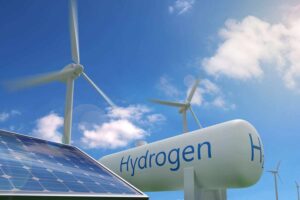With accelerated uptake in global markets, enhanced technological innovation and falling costs of fuel cells, green hydrogen has emerged as a viable carbon-free energy source in Angola’s transition to a clean energy future. Using electricity derived from renewable energy sources, hydrogen is produced by splitting water into hydrogen and oxygen through the process of electrolysis. As a result, the energy source has the ability to reduce pollution and increase the pace and penetration of renewable energies, while being produced locally from a variety of sources.
Angola is well suited to the development of hydrogen, owing in part to the country’s abundant hydrological resources and a favorable climate for the development of renewable energy projects. According to estimates, the southern African country uses just five percent of its 47 major water catchment areas and has large untapped water reserves. The Angolan Government is firmly committed to a long-term decarbonization strategy – seeking to increase the proportion of renewables in its energy matrix to 70% by 2025 – in which hydrogen could play a critical role.
A number of hydrogen projects are already underway in Angola. In November 2021, Sonangol reached an agreement with two German engineering companies, Gauff Engineering and Conjuncta, for the construction of a green hydrogen facility in Angola. Upon completion, the hydrogen plant is expected to produce around 280,000 tons of green ammonia for export from 2024, and would make Angola the first African country to supply Germany with green hydrogen. Given that Germany is dependent on natural gas imports from Russia, this point is particularly salient. As European nations seek to reduce Russian gas imports, African hydrogen could serve as an alternative fuel source for the continent, achieving energy security and reducing environmental impacts in the process.
To date, Germany has taken the lead in supporting hydrogen development in both Angola and on the continent at-large. In May 2021, the German Ministry of Research and Education presented a study identifying in which West and Southern African markets green hydrogen could be produced. The German Government has pledged $41.9 million for a national strategy to develop green hydrogen in Angola’s neighbor Namibia, as well as set up a hydrogen office in Nigeria.
As Angola continues to craft its long-term strategy regarding the utilization of hydrogen, a number of technical and conceptual studies are currently underway. These studies aim to identify the ideal location for a green hydrogen plant in-country, as well as the quantities required to meet domestic energy production needs, while preparing Angola to export hydrogen once the regional market has matured sufficiently. In contrast to more arid countries in other parts of Africa and the Middle East, Angola does not need to desalinate water to use it for hydrogen production, which reduces energy consumption and associated costs.
While Angola is still in the early stages of adopting hydrogen technology, several African countries are also pursuing hydrogen as part of their respective transition strategies, including Egypt, South Africa, Mauritania, Namibia and Morocco. Neighboring South Africa, for instance, boasts significant potential for the production and global export of hydrogen, thanks to world-class solar and wind resources and access to platinum metals used in electrolyzers. The country has identified three hubs and nine potential hydrogen projects across transport, industrial and construction sectors that have the capacity to deploy hydrogen-fuelled solutions and stimulate new areas of economic activity. Angola is set to join the ranks of sub-Saharan African producers to pioneer hydrogen development on the continent and become a major exporter to global markets.
This article is from the publication Energy Invest: Angola, which will be distributed at the upcoming Angola Oil & Gas (AOG) 2022 Conference & Exhibition, taking place on November 29 – December 1 in Luanda.
Fonte: Energycapitalpower


